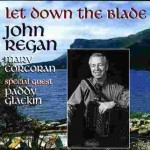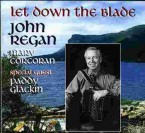with Mary Corcoran, Colum and Donal Regan
The title of this new CD refers to a saying of John's father when it was time to save the hay and it works as an allegory for this great album. Many people have said its about time John Regan got out his accordion and harvested a new recording and here at last it is. John, one of Ireland's most respected accordionists teams up with his long time musical sparring partner, Dublin fiddler, Paddy Glackin to produce an album of flawless traditional music played at a beautifully considerate pace. Many of these tunes haven't been recorded previously.
Mary Corcoran of the Templehouse Ceili Band on piano provides uncluttered accompaniment.
John also plays some duets with two of his sons, Donal and Colm both current All-Ireland title-holders on the box.
The Golden Keyboard:
The Queen of the Fairies:
James F. Dickie:
The Golden Keyboard / The Bellharbour Reel
The Maid at the Spinning Wheel / A Visit to Ireland
The Queen of the Fairies / Victoria Hornpipes
The Flax in Bloom / Colonel Rodney
The Tailor's Twist / The Friendly Visit
Billy McCormack's / The Ship in Full Sail
The Greencastle Hornpipe / The Kildare Fancy
The Maid at the Well / The Knocknagow Jig
Tom Ward's Downfall / The Piper's Despair
The Road to Ballymac / The Policeman's Request
Sliabh Russell / Bimis ag Ol
Spillane the Fiddler / President Garfield
Scotch Mary / Farewell to London
Buttermilk Mary / The Knights of St Patrick
James F. Dickie / Drops of Brandy
The Laurel Bush / The Sligo Lasses
The Waltz from "Coppelia"
Mulqueeney's Hornpipe
Miss Langton's / The Copperplate
Press Reviews
Folk Roots Aug/Sept 2000
John Regan is a north Sligo button box player who moved to Dublin some years ago and bumbed into players like Mary Bergin and a young Paddy Glackin.
Paddy joins John for five tracks and Mary Corcoran's solid piano underpin a regular but lively selection of reels, jigs and hornpipes that will appeal to his fans.
Joe Crane
The LivingTradition May/June 2000
Back when I'd aspirations to play the button box, I used to listen to as much of John Regan's playing as possible. My playing didn't improve but I liked his style, and still do. He partnered fiddler Paddy Glackin on the first ever Comhaltas concert tour of Britain, back about 197O~ Somewhere, I've a tape of him playing in the square in Listowel in 1972; no audience, just playing for the love of it. He seemed to drop out of earshot for a long time but he certainly didn't rust away, because he's as good as ever I remember him. This is good Sligo-style accordion, crisp and driving, without over-ornamentation. There's obviously influence from Joe Burke, but Regan's his own man all the time.
The 19 tracks are a balanced mixture of reels, jigs, and more hompipes than you'd normally expect. Most are familiar, some less so. Besides solos, John plays 5 duets with Paddy Glackin, and accordion duets with each of his young sons, CoIm and Donal. Most tracks have Mary Corcoran's sensitive and unobtrusive piano accompaniment, a welcome change from some of the piano drivers I've heard. A happy combination is of strathspey and slip jig; unusual, but it works. 'James F Dickie" just slides into a Donegal version of "Drops of Brandy". The surprise of the album is a duet with Donal on piano on Delibes' Waltz from "Coppelia". I'm usually scornful of "cross-over" but if this is what it's about, then I'm all for it. I suppose it's evidence that good music is universal and timeless.
The inlay notes are concise and adequate, with the sources of each tune, and tributes to many other musicians, from Patsy Tuohy to the current crop. Definitely one for the more discerning accordion fan.
(By the way, I finally gave up on the box. I realised that nof only did the left hand not know what the right hand was doing, it didn't even know what it was doing itself.) Mick Furey.
Irish Music Mag
From John Regan, one of the finest accordionists over the past 20 years, comes a new recording that will delight those who have enjoyed his tasteful and relaxed approach to music. Featuring plenty of well known tunes alongside ones of rarity, John Regan strikes a lovely balance on this recording with sets such as The Flax in Bloom/ Colonel Rodney, showing the flowing and unforced quality which is such a hallmark of his playing. Featuring piano accompaniment throughout from the able Mary Corcoran, this album also sees a guest appearance by fiddler Paddy Glackin who joins John for many a fine set. Similarly to Brian Rooney's album, John plays the great jig, Buttermilk Mary and what great spirit there is in this playing. Another track of note sees John joined by his son, Colm, for a beautifully measured set of unusual reels, The Road to Ballymac/The Policeman's Request. A most welcome addition to the collection of accordion albums, which like most others, is continually growing. Oisin MacDiarmada. Dec/Jan 2,000
The Irish Post
Irish music is simple. You get three good musicians, pick a couple of dozen tunes from the traditional repertoire of 6,000 pieces and press the record button.
Don't add anything fancy, mind. Just use a top-class accordion player, (John Regan), a top-notch fiddler (Paddy Glackin), and one of the finest piano accompanists around (Mary Corcoran from the Templehouse Ceili Band).
What you end up with is a memorable traditional album with no frills, just plenty of great music. Let Down the Blade opens with a haunting reel, The Golden Keyboard, composed by Galway man, Martin Mulhaire, who has spent most of his life in New York. This well structured tune has shades of that great Irish set piece, Drowsy Maggie about it, but is altogether less jaunty, giving the melody an added poignancy. Played on the button accordion by John Regan you can almost hear the strains of the immigrant in the Bronx wafting through the air.
John Regan is originally from north Sligo, but moved to Dublin in 66, which accounts for the inclusion of jigs such as Sliabh Russell and Bimis ag Ol on the album, two favourites of pipers and fiddlers in the late 60s/early 70s, but not heard so often these days. John's sojourn in Dublin however has given him an eclectic repertoire from which to choose. Everything from the definitive Michael Coleman version of the huge reel Tom Ward's Downfall to the welcome inclusion of that Scottish traditional oddity the Strathspey.
There is one delightful aberration on Let Down the Blade — The Waltz from the ballet, Copelia by the 19th century composer Leo Delibes. From The Geese in the Bog to Swan Lake in one ethnomusicological leap! But I tell you what — it's a great version and the most ballet I've listened to all year. Bravo, as they say at Covent Garden, both to Copelia's Waltz, and to the whole album. Malcolm Rogers, Dec/Jan 2,000
The Irish World
Of all instruments used in traditional music, the accordion is probably my least favourite, but even so, in the hands of John Regan, and his sons Colm and Donal, it creates quite an effective sound. With fiddler Paddy Glackin and accompanist Mary Corcoran on hand to lend their two-pence worth, there is plenty of music on this 19-track album to fill the ear.
The tracks include, hornpipes: Queen of the Fairies/Victoria/The Tailor's Twist/The Friendly Visit, Spillane the Fiddler/President Garfield's, jigs, The Maid at the Spinning Wheel/The Knocknagow, and reels like, Miss Langton's/The Copperplate, most with the bouncy nature that the accordion offers.
Both Colm and Donal Regan currently hold All-Ireland titles on the box, and the duets with their father make this album a family affair. L.A.Livingston




